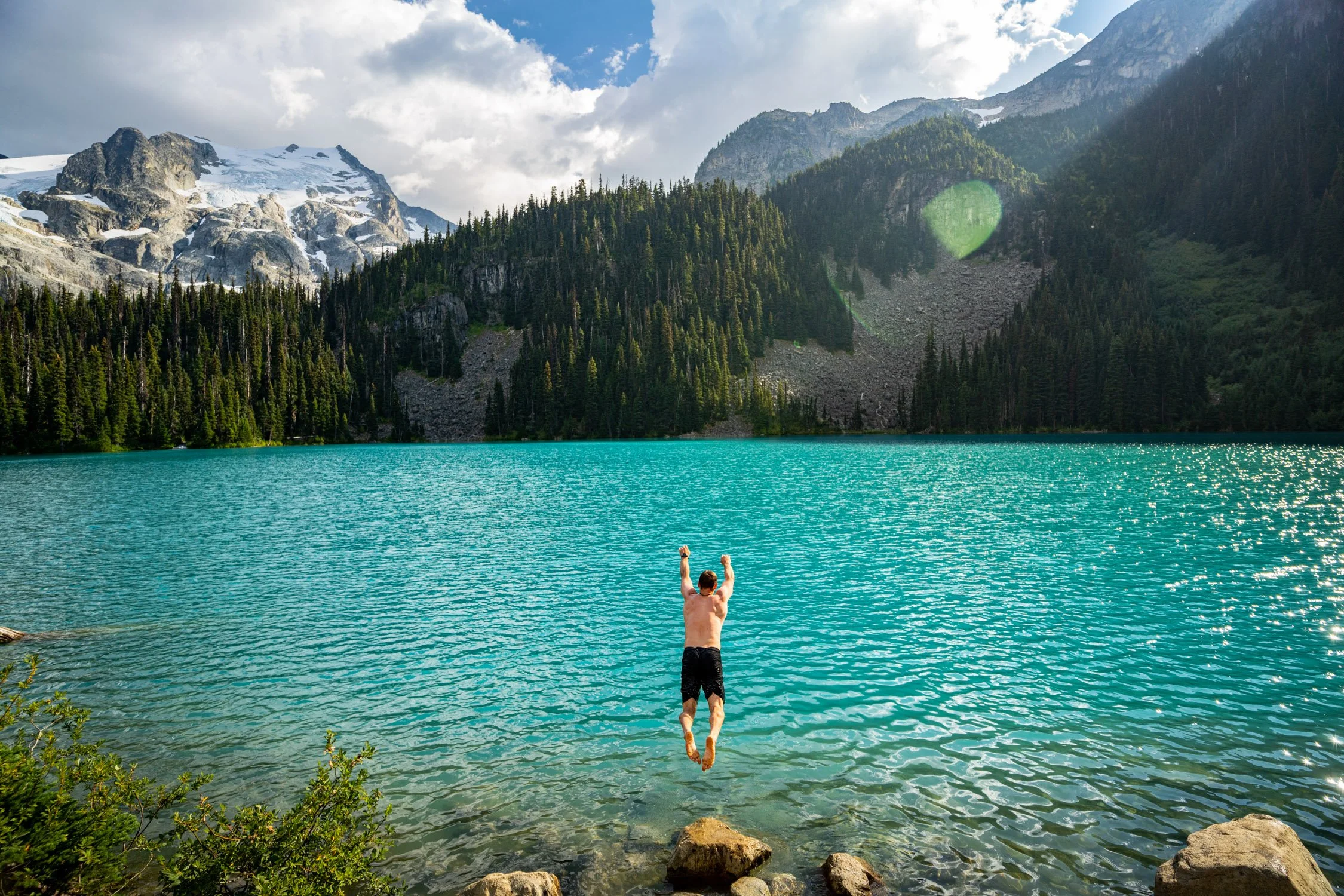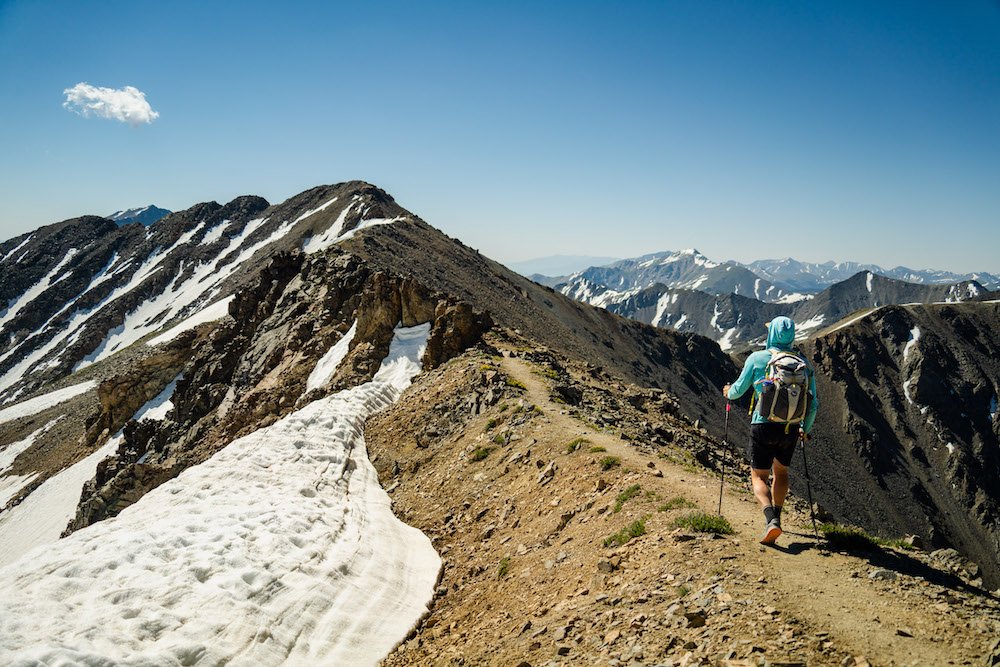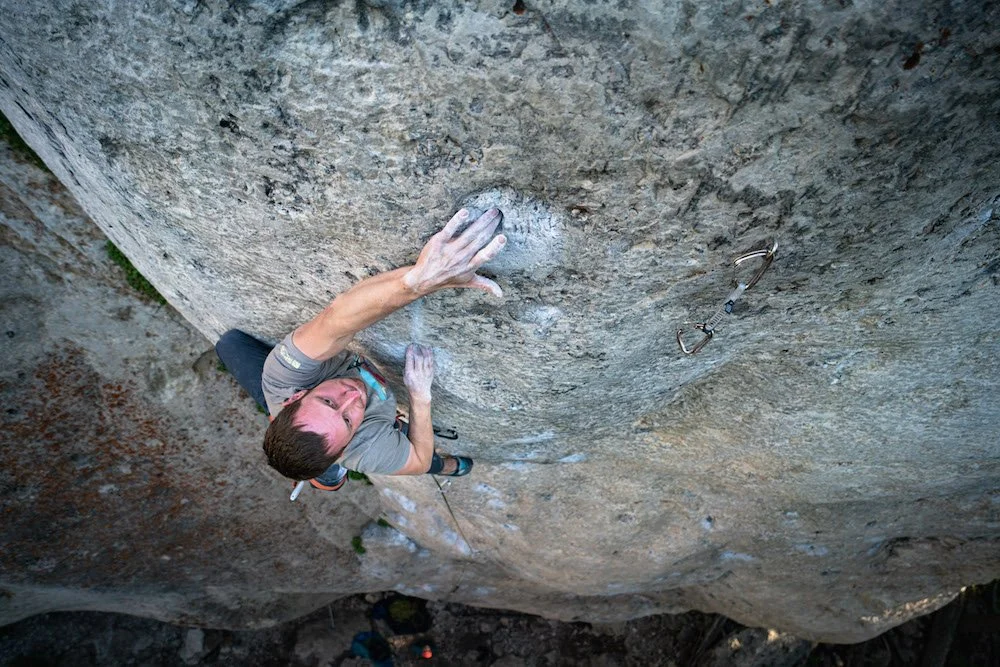Hiking Joffre Lakes, What You Need To Know Before You Go
There are those “by happen stance” occasions that just happen to work out, this is one of them. Driving back to the lower 48 from Alaska, I needed to use the bathroom. So, while in British Columbia, Kristin and I stopped in a large parking lot with bathroom. This lot seemed to be in the middle of no where, but that didn’t surprise me as there are several random lots along the drive from Alaska to the lower 48. However, very few of those lots had swarms of people. So, I asked somebody, “Why are there so many people here?”
They laughed and said they were doing the prettiest hike to in all of British Columbia, Joffre Lakes.
Jumping into the gorgeous blue color waters of Joffre Lakes in British Columbia. Photograph by Dalton Johnson
Pros
Breathtaking Scenery: Joffre Lakes is renowned for its stunning alpine scenery, including three picturesque turquoise lakes surrounded by snow-capped mountains and glaciers. The views along the hike are simply breathtaking.
Variety of Hiking Trails: The park offers a variety of hiking trails suitable for different skill levels, from the easy walk to the first lake to the more challenging trek to the third lake. This makes it accessible to hikers of various abilities.
Photographic Opportunities: The natural beauty of Joffre Lakes provides numerous opportunities for photography. The vivid blue lakes, glaciers, waterfalls, and lush forests make for great photos.
Wildlife Viewing: You may encounter wildlife like birds, chipmunks, and marmots during your hike. Keep your camera ready for some wildlife photography.
Camping Options: Joffre Lakes Provincial Park offers camping facilities, allowing you to extend your stay and enjoy the tranquility of the area.
Adventure and Challenge: For experienced hikers, the trail to the third lake is challenging, offering a sense of adventure and accomplishment when you reach your destination.
Cons
Crowds: Joffre Lakes has become increasingly popular in recent years, leading to overcrowding, especially during peak seasons. This can detract from the peacefulness of the experience and make parking and trail access more challenging.
Limited Parking: Parking at the trailhead can be a significant issue, especially on weekends and holidays. Arriving early or using alternative transportation methods can help alleviate this problem.
Weather Variability: Weather conditions in the mountains can change rapidly. Be prepared for sudden temperature drops, rain, or snow, even in the summer months.
Trail Conditions: Depending on the time of year, the trail can be muddy or covered in snow and ice, making it slippery and potentially dangerous without proper gear and precautions.
Difficulty: While there are easier trails in the park, the hike to the third lake is challenging and not suitable for everyone. It involves steep ascents, rugged terrain, and can be physically demanding.
Environmental Impact: The popularity of Joffre Lakes has led to concerns about the environmental impact on the delicate alpine ecosystem. It's essential to follow Leave No Trace principles and stay on designated trails to minimize harm to the environment.
For me, that seemed like a bold statement, but I was intrigued. So I pried a little bit more, “Really, what makes it so pretty?”
“You haven’t heard of Joffre Lakes?” This random person responded, “Why are you here then?”
“I am driving back from Alaska, I just needed to pee.”
“Sadly, I think you will need to get a permit and they are all booked today. Also, there is no service here. I don’t know how you could hike it today, but I highly suggest you make time for the hike. It is lovely.” The random human encouraged.
“Thank you! I’ll see what I can do.”
Turns out, they were right about the lack of service in the area. There isn’t any. Additionally, I saw a ranger who said they were booked for the day, but to check online once we had service as people cancel from time to time. Both Kristin and I were now disappointed. We didn’t have the time to wait around a couple of days to get a permit, so we drove down the winding hill.
At the bottom of the hill, Kristin looked up the ticket registration while we made some lunch. Turns out, there were a couple of tickets left. She reserved the tickets and we drove back to the trailhead to join the masses on the hike.
I must say, this trail was packed with humans!
Everything You Need To Know about Joffre Lakes:
How To get a permit and hike joffre Lakes
Hiking and camping—yes you can camp at these gorgeous lakes—in Joffre Lakes Provincial Park is undoubtedly one of the most beautiful experiences in all of British Columbia, Canada. With its lush, emerald forests and vivid turquoise waters – Joffre is the Canadian explorers’ dream.
The lakes are 2.5 hours from the Vancouver Airport and 30 minutes from Whistler
You need a permit to day hike and/or camp CLICK HERE
Make sure to check if Joffre Lakes is open CLICK HERE
You have to bring your own toilet paper for the restrooms
Best time to hike is between July and August, though Joffre Lakes Provincial Park is open year round
Related Read: How To Backpack Joffre Lakes
Overlooking the middle lake of Joffre Lakes in British Columbia. Photograph by Dalton Johnson
The Ideal Backpacking Itinerary for Joffre Lakes
If you are lucky enough to snag a backpacking permit for Joffre Lakes, take it! Backpacking in Joffre Lakes Provincial Park offers a fantastic opportunity to immerse yourself in the stunning alpine scenery of the area. Here's a suggested backpacking itinerary, keeping in mind the camping restrictions, permit requirements, and safety considerations:
Day 1: Arrival and Hike to Upper Joffre Lake
Arrive at Joffre Lakes Provincial Park early in the day to secure a parking spot, as it tends to get crowded.
Begin your hike from the parking lot to the first lake, Lower Joffre Lake, which is not suitable for camping.
Continue your hike to the second lake, Middle Joffre Lake, which also does not permit camping.
After enjoying the scenery at Middle Joffre Lake, continue your hike to the third and uppermost lake, Upper Joffre Lake.
Set up camp at one of the designated backpacking campsites near Upper Joffre Lake. These sites require permits, so be sure to have them in advance.
Day 2: Explore Upper Joffre Lake and Surroundings
Spend the morning exploring the area around Upper Joffre Lake, taking in the stunning views of the glacier and surrounding peaks.
You can also enjoy a swim in the frigid, turquoise waters of the lake if you're up for it.
In the afternoon, consider taking a short hike to one of the nearby viewpoints for even more breathtaking vistas.
Return to your campsite at Upper Joffre Lake for another night of camping.
Day 3: Hike Back to the Trailhead
After a leisurely morning at Upper Joffre Lake, start your hike back to the trailhead.
Take your time to appreciate the scenery once more as you descend the trail.
Ensure that you follow Leave No Trace principles, leaving the wilderness as pristine as you found it.
Finally, return to the parking lot and conclude your backpacking trip.
Remember to check the current permit requirements and availability, as regulations and quotas may change. Additionally, as mentioned, it's safer and more enjoyable to hike in a group, especially in the backcountry. Be prepared with appropriate gear, clothing, and food for your trip, and always prioritize safety and environmental responsibility while enjoying this beautiful area.
Kristin testing her balance out on a log going into the water at Joffre Lakes. Photograph by Dalton Johnson
Here’s How long you need to hike all three joffre lakes
Hiking to all three Joffre Lakes can either be completed as a day hike, or you can purchase a permit to stay overnight at one of the camping sites. The 9.2-kilometer / 5.7-mile roundtrip hike takes about 3 – 5 hours, depending on your pace and the number of rest stops. You don’t have to go all the way up to the third lake to enjoy the beauty of the park, but I encourage it! Many visitors choose to turn around as the second hike. On average, the first lake takes about 5 minutes to reach from the parking lot, while the second lake takes 1.75 hours and the third lake 2.5 hours (one way). The last lake is worth hiking to, especially if you are looking to escape the crowds.
LOWER JOFFRE LAKE TRAIL STATS
Difficulty: Easy
Distance: 0.2 km / 0.1 miles (roundtrip)
Elevation gain: N/A
MIDDLE JOFFRE LAKE TRAIL STATS
Difficulty: Intermediate
Distance: 5.5 km / 3.43 miles (roundtrip)
Elevation gain: 410 m / 1,348 ft
UPPER JOFFRE LAKE TRAIL STATS
Difficulty: Intermediate
Distance: 9.2 km / 5.72 miles (roundtrip)
Elevation gain: 673m / 2,209 ft
Should I hike to Upper Joffre Lake?
If you're up for a bit of extra adventure and the opportunity to experience a more secluded and picturesque side of Joffre Lakes Provincial Park, hiking to Upper Joffre Lake can be a rewarding choice. While the views might not be dramatically different from Lower Joffre Lake, the additional hike offers several enticing advantages.
One of the highlights is the improved perspective of the glacier, allowing you to appreciate its magnificence up close. Moreover, the trail takes you past a cascading waterfall, adding an enchanting element to your journey. The seclusion and tranquility of Upper Joffre Lake also make it an ideal spot for a peaceful picnic, providing a unique and serene outdoor experience for those who choose to venture further into the park.
Splashing into the cold water of Joffre Lakes. Photograph by Dalton Johnson
Tips for swimming in joffre Lakes:
Absolutely, you can take a refreshing swim at Joffre Lakes, and it's an experience you shouldn't miss. The crystal-clear, turquoise waters of the lake are not only stunning to look at but also inviting for a dip. However, it's essential to be prepared for the cold water, as the glacier-fed lake can be quite chilly, and your initial immersion might take your breath away.
Once you acclimate, though, the cool waters are incredibly invigorating, offering a unique and unforgettable swimming experience amidst the breathtaking natural beauty of the park. Don't forget to capture the moment with a photo or video for your Instagram feed to share your adventure with others and inspire them to explore this stunning natural gem as well.
Things to bring when Day hiking joffre lakes:
If you are lucky enough to get an overnight permit for Joffre Lakes, you should take it. If not, you will be day hiking the lakes, which is still a fantastic experience. During your day hike, I highly suggest you bring the following:
Go-to hiking boots are Columbia Newton Ridge or Merrell Moab’s
A swim suit, the water is cold but you just need to take a dip, so quick dry hiking shorts are great
Sunscreen, like Dermatone or Sunbum, that won’t destroy the water if you swim
Sunglasses that are polarized, my favorite afforadable sunnies are Sunski and Goodr
Day Pack like the Big Agnes Impassible or the Osprey Sportlite
Water bottle and filter like the Katadyn BeFree system
Hiking poles, the Leki Khumbu Lite are my go-to poles for all hikes
Snacks, on snacks, on snacks… looking for something different? Try Moon Fruit!
A towel that is quick-dry and easy to use like a Nomadix
Related Read: What To Bring When Hiking Joffre Lakes
Joffre Lakes History:
Joffre Lakes Provincial Park, located in British Columbia, Canada, has a relatively brief but interesting history:
Discovery and Exploration (19th Century): The area around Joffre Lakes has a long history of indigenous use by First Nations people, but it gained more prominence in the late 19th century as European explorers and settlers began to venture into the region. However, the park as we know it today was not established at this time.
Logging and Resource Extraction (20th Century): Throughout the 20th century, the area around Joffre Lakes was primarily used for resource extraction, including logging and mining. The region's natural beauty remained relatively undiscovered by the general public during this period.
Protection and Establishment of Joffre Lakes Provincial Park (1988): Joffre Lakes Provincial Park was officially established in 1988. Its creation aimed to protect the pristine alpine lakes, surrounding forests, and stunning mountain landscapes from further development and environmental degradation. The park was named after General Joseph Jacques Césaire Joffre, a French military commander during World War I.
Rising Popularity (21st Century): In the 21st century, Joffre Lakes gained popularity as a hiking destination, thanks in part to its accessibility from Vancouver and the incredible natural beauty it offers. The park's popularity grew through social media and word of mouth, leading to increased visitation.
Challenges and Conservation Efforts: The park has faced challenges related to overcrowding, environmental impact, and the strain on its infrastructure due to the surge in visitors. Conservation efforts and visitor management strategies have been put in place to mitigate these issues and protect the park's delicate ecosystem.
Joffre Lakes frozen over in the winter.
what to know about hiking joffre Lakes in winter
Hiking Joffre Lakes in the winter is possible, but it can be a challenging and potentially hazardous adventure. Here are some important considerations:
Snow and Ice: During the winter months, the trails at Joffre Lakes are typically covered in snow and ice. This can make hiking conditions treacherous, especially if you don't have the appropriate gear, such as microspikes or crampons, to provide traction on icy surfaces.
Avalanches: The area around Joffre Lakes is prone to avalanches in the winter. Avalanches can be extremely dangerous, and hikers need to be aware of the avalanche risk and have the necessary knowledge and equipment for avalanche safety if they plan to hike in this season.
Reduced Visibility: Winter weather in the mountains can change rapidly, leading to reduced visibility due to fog, snowfall, or low clouds. This can make navigation more challenging and increase the risk of getting lost.
Shorter Days: In the winter, the days are shorter, which means you have less daylight for your hike. It's important to plan accordingly and start early to ensure you have enough time to complete your hike and return safely before darkness falls.
Limited Access: The road to the trailhead at Joffre Lakes may be closed or difficult to access during the winter due to snow and ice. Be sure to check road conditions and park closures before attempting a winter hike.
Experience and Preparedness: Winter hiking in the mountains requires a higher level of experience and preparedness. You should be well-equipped with warm clothing, proper winter hiking gear, navigation tools, and knowledge of winter backcountry safety.
If you are an experienced winter hiker and are well-prepared for the challenges and risks associated with hiking in snowy and icy conditions, Joffre Lakes can offer a serene and stunning winter landscape. However, for most people, especially those without experience in winter backcountry travel, it is safer to explore Joffre Lakes during the milder seasons when the trails are more accessible and conditions are less extreme. Always prioritize safety when considering a winter hike in any mountainous area.
Braving the cold waters while hiking to Upper Joffre Lakes in British Columbia.Photograph by Dalton Johnson
British Columbia is truly a dream destination for hikers and road trips, and Joffre Lakes is just one of the many beautiful spots in this gorgeous province! I hope this Joffre Lakes hiking guide has inspired you to visit or add this destination to your bucket list. If you’ve ever been, I would love to hear about your experience in the comments below!















